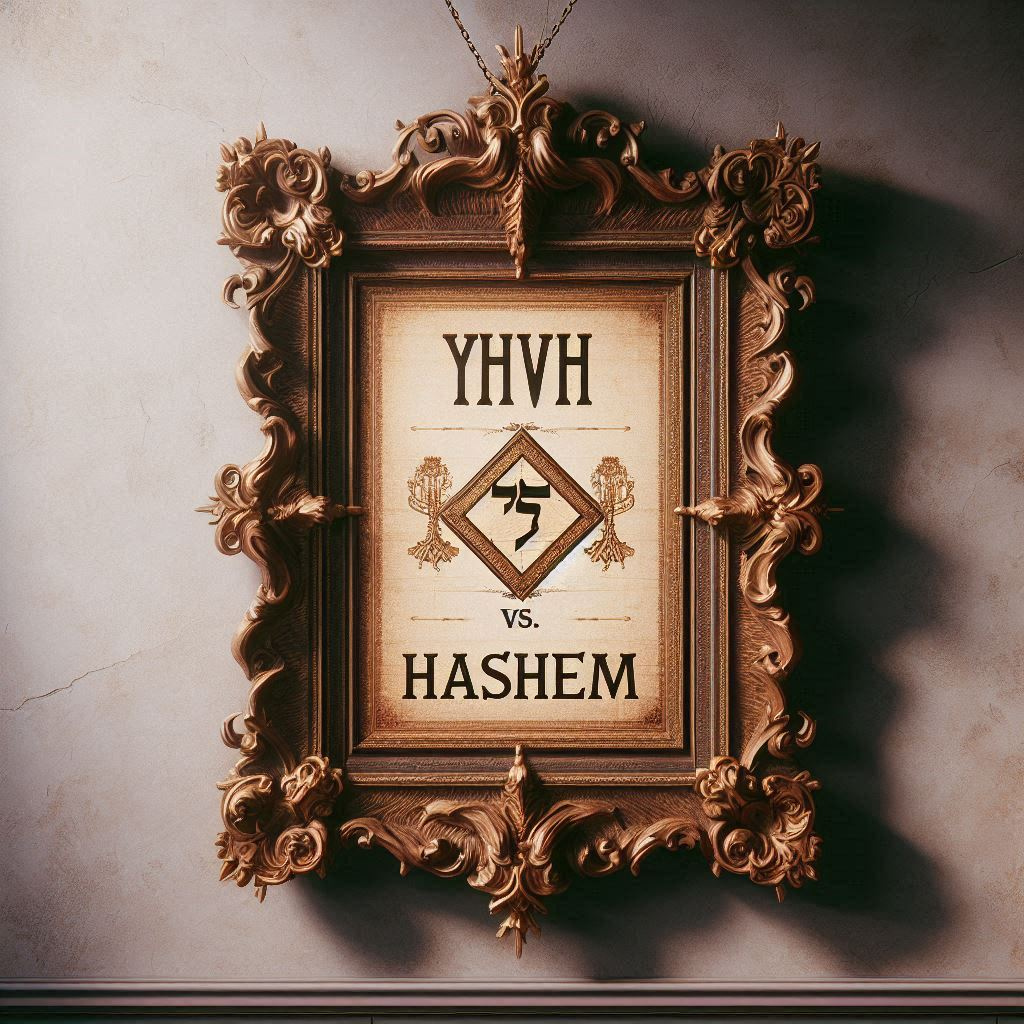The Ineffable Name Controversy: Breaking Traditions and Unveiling Truth
Introduction: In the realm of faith, the Name of Yehovah holds profound significance. However, the tradition of not uttering or writing this sacred name has sparked controversy and debate. This blog post delves into the origins, interpretations, and implications of this practice, shedding light on the true essence of the Ineffable Name.
The Tradition of Writing “G-d”: Many Jewish communities avoid writing the full name of God, opting for “G-d” instead. This practice stems from a passage in Deuteronomy, which commands the Israelites to destroy the names of non-Israelite gods. Rabbinic interpretations extended this to mean that God’s name should not be erased, leading to the tradition of writing “G-d”1.
Rabbinic Interpretations and Misinterpretations: Rabbinic authorities, such as Rashi, interpreted the prohibition against erasing God’s name as a reason to avoid writing it altogether. This led to the practice of storing or burying Jewish literature containing the name “God” once it fell into disrepair2. However, this interpretation has been contested, as the original scriptural intent was to prevent the worship of Yehovah in the manner of pagan gods3.
The True Name of Yehovah: The Father revealed His eternal and holy name to Moses, declaring it to be remembered for all generations (Exodus 3:15). Despite this, Rabbinic authorities replaced the name Yehovah with titles and descriptors like “Adonai” and “Elohim,” effectively nullifying the Torah’s instructions regarding the use of God’s name4.
The Impact of Rabbinic Regulations: By enacting regulations against using God’s name, Rabbinic authorities transgressed Yah’s eternal Torah. This has led to a widespread practice of substituting God’s name with titles, which often have pagan origins5. This practice contradicts the scriptural mandate to declare and magnify Yehovah’s name throughout the earth6.
Conclusion: As Torah-observant disciples, it is our duty to honor and proclaim the true name of Yehovah. By doing so, we fulfill the scriptural command to declare His name to all generations. Let us break free from traditions that obscure the true essence of God’s name and embrace the profound significance of Yehovah.
For those of you who would like to explore this week’s Torah Reading 13, I invite you to read and listen to the discussion entitled “Yehovah: the God Who Sees.” (Yehovah-The God Who Sees-STAR 13)
Divine Judgment and Mercy and Righteousness: The Story of Sodom and Lot – Thoughts and Reflections on Torah Reading 16
Lot’s Privileged Life in Sodom Lot, Abraham's nephew, sits at Sodom's gate (19:1). What is the significance of Lot being seated at Sodom's gate? It’s likely that Avraham’s victory over Chedorlaomer’s and three other powerful Mesopotamian kings’ assault on the city...
Unveiling the Truth-Yeshua’s Prohibition Against Titles in Matthew 23:8-12-Part 2
Greetings and Introduction Greetings saints of the Most High. Welcome to another installment of the Messianic Torah Observer. Rod Thomas coming to you on a beautifully mild Preparation Day here in the DFW. Thank you for taking the time out of your busy schedules to...
Living in Yah’s Presence: The Call to Holistic Righteousness
Greetings and Shalom to you saints of the Most High. I went through some of this past Sabbath’s Torah Reading (i.e. Torah Reading 14 of Yah’s 3-year Torah Reading Cycle). And in my reading of this parshah, I became captivated by just the first three-verses of the...
Unveiling the Truth-Yeshua’s Prohibition Against Titles in Matthew 23:8-12-Part 1
Introduction Greetings saints of the Most High. Welcome to another installment of the Messianic Torah Observer. Rod Thomas coming to you on a gorgeous winter Preparation Day here in the DFW. Thank you for taking the time out of your busy schedules to fellowship...
The Royal Priesthood: Exploring the Historical, Spiritual, and Eschatological Roles of Melchizedek-Part 1
The Royal Priesthood: Exploring the Historical, Spiritual, and Eschatological Roles of Melchizedek - Part 1 Greetings, saints of the Most High! Welcome to another installment of the Messianic Torah Observer. I'm Rod Thomas, coming to you on a wintry Preparation Day in...
Exploring the Historical and Theological Aspects of Noahide Laws – Part 2
Exploring the Historical and Theological Aspects of Noahide Laws - Part 2 Greetings, saints of the Most High! Welcome to another installment of the Messianic Torah Observer. Today, we delve into the second part of our discussion on the Noahide Laws, a concept...
Trusting in the Divine Plan-The Significance of Avraham’s Covenant with Yehovah — Thoughts and Reflections on Torah Reading 10
Greetings, saints of the Most High! Welcome to another installment of the Messianic Torah Observer. I'm Rod Thomas, coming to you on a very dreary Preparation Day in the DFW. Thank you for taking the time out of your busy schedules to fellowship with me. As always, it...
Noahide Laws-A Historical and Theological Exploration Part 1
Greetings, saints of the Most High! Welcome to another installment of the Messianic Torah Observer. Today, we delve into the fascinating topic of the Noahide Laws, exploring their origins, development, and implications for both Jews and Gentiles. Introduction to...
From Noah to Nations: Unveiling the Prophetic Journey — Thoughts and Reflections on Torah Reading 8
In this Torah Reading Discussion, "From Noah to Nations-Unveiling the Prophetic Journey-Thoughts and Reflections on Torah Reading 8," we delve into the profound insights of Torah Reading 8. This study explores Genesis 9.18-10.32, Isaiah 49.1-13, and Revelation 5.1-14,...
From Flood to Faith: The Enduring Promise of the Noahic Covenant — Thoughts and Reflections on Torah Reading 7
The Noahic Covenant: Humanity's Path to Redemption Greetings, saints of the Most High. Welcome to another installment of the Messianic Torah Observer. I'm Rod Thomas, coming to you on a beautiful Shabbat in the DFW area. I hope this message finds you and your loved...

